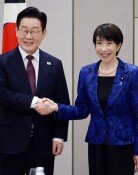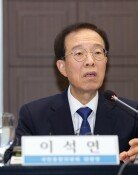[Editorial] Mounting Policy Failures
[Editorial] Mounting Policy Failures
Posted November. 27, 2006 07:05,
On November 25, President Roh proposed a tripartite meeting between the government, the ruling Uri Party, and opposition parties to cope with pending key matters in the National Assembly and to discuss the policy direction for the rest of his tenure, said Lee Byeong-wan, the chief presidential aide. It is said to be Rohs second trump card to seek a breakthrough after his 2005 grand coalition proposal.
Referring to previous administrations where drifting policies and crippled politics triggered the 1997 economic crisis, Lee blamed the stalled parliament and the intensified confrontation between the ruling and opposition parties for the current policy impasse.
He appears to attribute the current policy failures and a possible economic crisis to the National Assembly. No wonder the opposition parties are criticizing that the government has been ascribing its faults to misguided politics in the National Assembly.
Today in Korea, the stunted Korean economy, mounting security concerns and left-wingers extremely radical demonstrations are threatening the nerves of the state. The fundamental failures are accountable for what is called the 386 generations policy failure, led by student activists-turned-policymakers and politicians in Korea. They have used the president as an instrument to deliver their left-inclined ideology. They turned Korea into a business-unfriendly nation with their anti-market code policies. Their anti-market code has alienated the longtime alliance between Seoul and Washington and the Between Us policy -indicating only South and North Korea- has isolated the Korean diplomacy in dealing with the North Korean issues. Their egalitarian code has brought the education competitiveness to the verge of collapse. Their biased populist policies have pretended to involve the majority, but have resulted in excluding the minorities. Their wretched utopian policies based on leftist ideology have resulted in a total failure, adding more burdens on the shoulders of the Korean citizens.
Their habitual mistakes in personnel management in the administration are a malicious code. The Constitutional Court Chief Justice appointment dispute involving Jeon Hyo-suk has left the Constitutional Court and the constitution stigmatized as unconstitutional, even though she brought an end to the dispute by resigning. They passed a reshuffling bill to reappoint Jeong Yeon-ju, the incumbent president of the Korea Broadcasting Station (KBS), and favored figures who uphold their independent-sunshine North Korea policy packages when appointing diplomatic and security policymakers. They just rotate their own people from one position to anther inside the government or government affiliates whenever personnel issues are raised and abuse the right of personnel management in the government to repay their peoples previous efforts for the regime. The president Lula de Silva of Brazil, who was recently re-elected, said, Neither friends nor trusty henchmen can be appointed to a position with heavy responsibility.
Last week, Cheong Wa Dae deleted some five hundred postings from the government-run website called Cheong Wa Dae Briefing, which criticized the governments real estate policies, but restored the posts after civil activists criticized the monitoring action. This reveals that the Roh administration only listens to what it wants to listen to.
Three months ago, Mr. Roh addressed the members of his supporters group, called Rohsamo, that There is no red signal in Korea, including politics, the economy and society. Judging from his remark, one may wonder what brought him to propose the tripartite meeting, even though he sees no alarming signs. Unless he departs from policies that have recklessly triggered policy disorder, to the eyes of Korean people, his proposal is only designed to run away from the quandary.




![[속보]美 “미국인은 이란 당장 떠나라” 대사관 긴급 공지](https://dimg.donga.com/c/138/175/90/1/wps/NEWS/IMAGE/2026/01/13/133147285.1.jpg)


